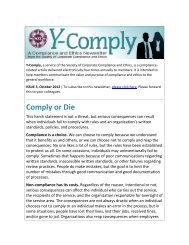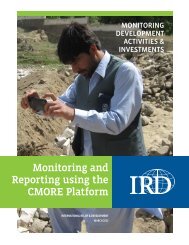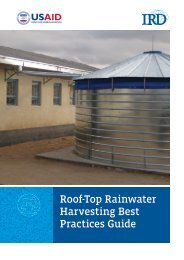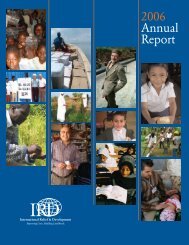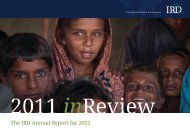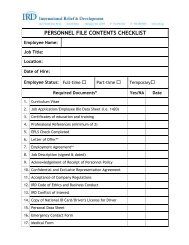Empowering citizens Engaging governments Rebuilding communities
Empowering citizens Engaging governments Rebuilding communities
Empowering citizens Engaging governments Rebuilding communities
Create successful ePaper yourself
Turn your PDF publications into a flip-book with our unique Google optimized e-Paper software.
Under the initial ICAP intervention, IRD<br />
completed 2,381 projects benefiting<br />
more than 20 million people and<br />
worth more than $73 million<br />
Box 1<br />
ICAP: Program and results<br />
1<br />
ICAP began in May 2003 as a mechanism to mobilize Iraqi <strong>communities</strong> to identify, prioritize, and address their<br />
most pressing civic needs. IRD oversaw operations in Baghdad; the rest of the country was divided among four other<br />
implementing agencies.<br />
IRD helped establish locally organized community action groups to drive project work, which was filtered through<br />
three broad program components: economic and social infrastructure to build and repair roads and public buildings;<br />
business development to provide grant support to micro, small, and medium businesses; and the Assistance to Civilian<br />
Victims Fund, which provided social and financial aid to innocent individuals and <strong>communities</strong> injured or afflicted<br />
by military forces.<br />
Building community trust<br />
Under the initial ICAP intervention (2003–06), IRD completed 2,381 projects benefiting more than 20 million people<br />
and worth more than $73 million—almost 40 percent of which was covered by Iraqi <strong>communities</strong> and the government<br />
through in-kind contributions. ICAP laid the foundation for the larger and more complex development and stabilization<br />
projects to come, and it<br />
yielded a number of positive<br />
Baghdad governorate districts and city districts<br />
performance measurements.<br />
At its conclusion, ICAP had:<br />
Al-Tarmiya<br />
• Generated more than 5,600<br />
short-term jobs and almost<br />
Taji<br />
Al-Istiqlal<br />
23,000 long-term jobs.<br />
Employment generation<br />
Adhamiya<br />
Kadhmiya<br />
Sadr<br />
City<br />
steadily rose for both short-<br />
9 Nissan<br />
and long-term jobs for each<br />
Abu Ghraib<br />
Taji Karkh<br />
Karada<br />
year of the program.<br />
Al-Mada’n<br />
Al-Rasheed<br />
• Established 441 community<br />
action groups with approximately<br />
5,500 members—a<br />
Mahmoudiya<br />
third of whom were women.<br />
• Completed more than 700<br />
infrastructure projects,<br />
including the construction or<br />
rehabilitation of 278 schools,<br />
75 health centers and hospitals,<br />
65 water and sewage facilities, 60 roads, and 38 sports and recreation facilities.<br />
• Invested $8 million in more than 1,100 business development projects, covering competitive grants, technical<br />
assistance, vocational and managerial training, marketplaces, cooperative grants, and handicap activities.<br />
• Aided more than 760,000 Baghdad residents through 515 projects assisting civilian victims.<br />
9


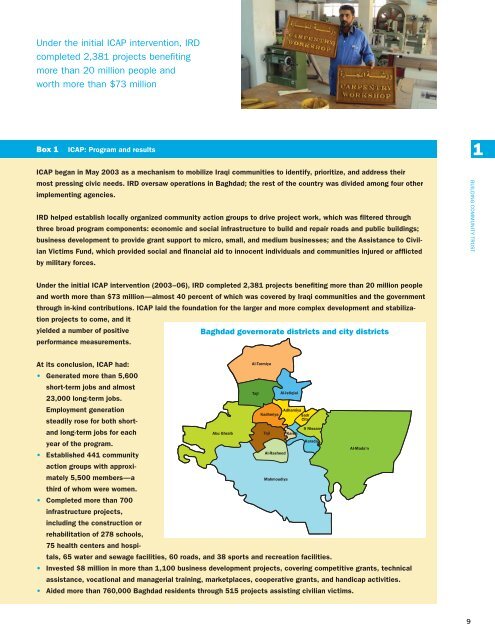
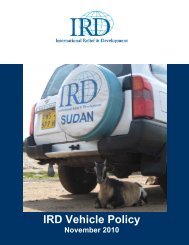
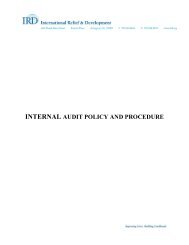
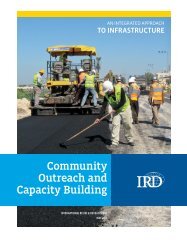
![Guide bonne pratique production d'oignon qualité_VF_4_2411012[1]](https://img.yumpu.com/23506639/1/184x260/guide-bonne-pratique-production-doignon-qualitac-vf-4-24110121.jpg?quality=85)

